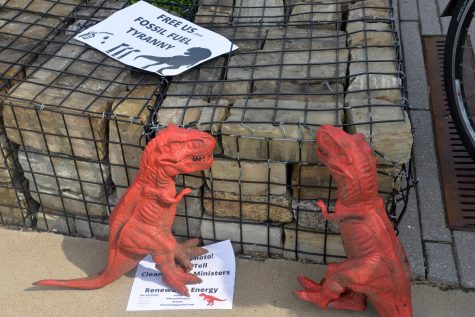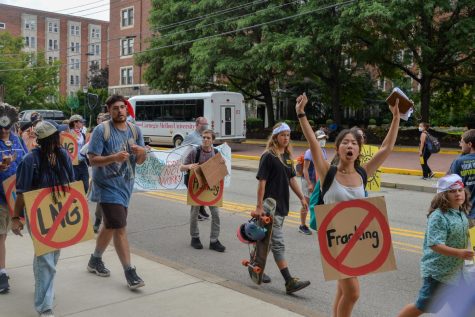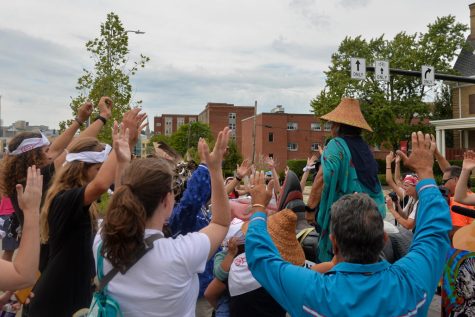Oakland climate strike protests ‘false’ clean energy solutions
Alexandra Ross | Senior Staff Writer
Protestors gather around a totem pole carved by the Lummi House of Tears Carvers during a climate protest in Oakland Wednesday afternoon.
September 21, 2022
There’s a quick and simple way to tell if a climate change solution is legitimate, according to Anaïs Peterson.
“If it’s not talking about getting off of fossil fuels in a just and immediate way, it’s not a viable or real climate solution,” Peterson said.
Peterson, who graduated from Pitt in 2020, was one of a few dozen people who gathered on Carnegie Mellon University’s campus on Wednesday afternoon to protest the first-ever Global Clean Energy Action Forum, which takes place this week in Pittsburgh. At the GCEAF, representatives from the government, international organizations, the private sector, academia and more will come together to discuss clean energy solutions to climate change. The climate strike included several speeches, the blessing of a Native American totem pole of the Lummi Nation and a march through Oakland.
Peterson said the strike’s organizers decided to protest the GCEAF because the Clean Energy Ministerial, involved with organizing the forum in Pittsburgh, supports what Peterson called “false solutions” to climate change, including blue hydrogen and carbon capture, utilization and storage. Peterson said clean energy solutions need to be renewable and accessible.
“We need to be thinking more expansively about what it means to have a clean energy future and realize that it’s not sustainable for all of us to have an electric car, but we need to be investing in public transit, we need to be investing in walkable cities,” Peterson said.
The event began with CMU student Ilyas Khan reading a land acknowledgement. Khan acknowledged that the protest took place on “stolen land” which belonged to Native Americans, and paid respects to Native American tribes including the Adena, Monongahela, Delaware, Seneca and more. After the land acknowledgement came a set of speeches, including one from each of the strike’s organizers — Peterson, Khan, Pitt student Emma Gray and Winchester Thurston School student Vanessa Gonzalez-Rychener.

Peterson’s speech highlighted the importance of climate justice, which aims to focus climate solutions on the communities most impacted by pollution and climate change. Peterson said solutions posed by fossil fuel companies — which often emphasize offsetting emissions rather than reducing them — perpetuate global racial and wealth inequalities.
“The truth is, their climate solutions are eco-fascism,” Peterson said. “Their climate solutions are to preserve and hoard resources for cis, white, able-bodied rich men who will continue to treat black, brown, indigenous, rural, poor communities and those in the global south like sacrifice zones.”

In her speech, Gonzalez-Rychener emphasized the need to get more people involved in the fight against climate change, instead of pushing away those who have never participated in climate activism.
“We need to see the good in the people at the back of the room, the people not at the protests, the people who care about climate change but care about their education more, the people who don’t know where to begin,” Gonzalez-Rychener said. “That’s what I’ve been trying to do with the Pittsburgh Youth Climate Council and Citizens’ Climate Lobby.”
After listening to speeches from the strike organizers, protesters moved to gather by a totem pole, carved by the Lummi House of Tears Carvers and named after the late Chief Tsilixw (also known as Bill James), hereditary chief of the Lummi Nation. Members of the Lummi Nation brought the totem pole to Pittsburgh from Washington state to participate in climate action, according to Wes Gillingham, associate director of Catskill Mountainkeeper, who traveled with them.
The representatives of the Lummi Nation invited all to place their hands on the totem pole and participate in a prayer over it, asking for blessings from the Earth and the heavens. Members of the Navajo Nation were also present.

Several of the Native American attendees gave speeches about respecting and connecting with nature and speaking up on behalf of the environment, before and after the blessing. Kwastlmut, whose English name is Sadie Olsen, said when she got to Pittsburgh she could feel the detriments of pollution already.
“I can feel how hard this place is on my health and I’m sitting here and I’m grieving for your animals, and I’m grieving for your plants, and I’m grieving for your water,” Kwastlmut said.
Following all the speeches and the blessing of the totem pole, protesters began to march through Oakland, escorted by police. They walked from the Cut on Carnegie Mellon’s campus to the William Pitt Union via Fifth Avenue, with members of the Lummi Nation driving behind them in a pickup truck, which hauled the totem pole.
Protesters shouted “1, 2, 3, 4, climate change is class war! 5, 6, 7, 8, Green New Deal in every state,” and many other chants and songs. Most carried signs promoting renewable energy and denouncing hydrogen and carbon capture, utilization and storage — signs that they borrowed from Peterson’s mother, Dianne Peterson, who painted them the day before with the help of other climate activists.
For a moment, the march paused in the middle of the intersection of Fifth and Craig, causing a chorus of honks from surrounding cars who were stuck at the light for about five minutes. As the group moved out of the intersection and towards Pitt’s campus, Khan had a message for drivers frustrated by the protest-related traffic.
“Everyone who has been honking at us maliciously… we’re out here right now for you just as much as we’re out here right now for us,” Khan said.








